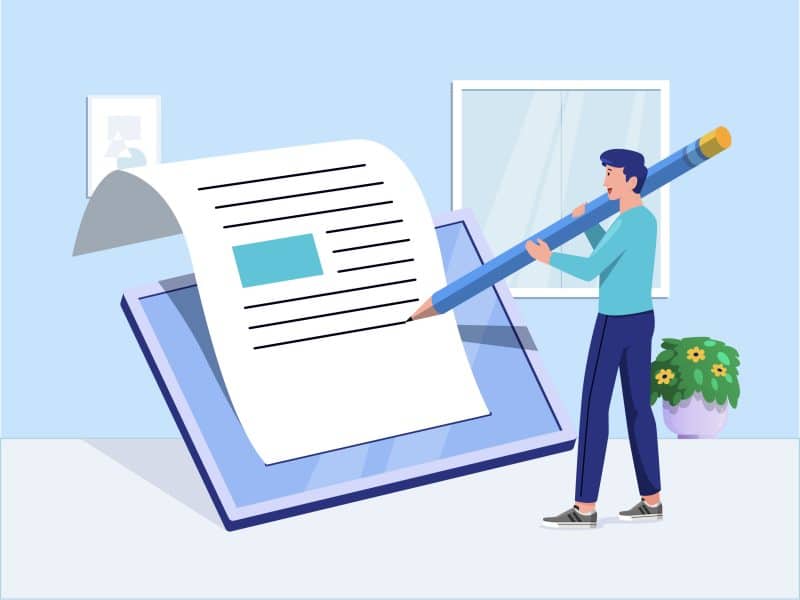Writing cover letters is nobody’s favorite part of the job hunt.
Cover letters feel outdated, hard to write, and you’re never quite sure if anyone actually reads them. So a lot of people either skip them or treat them like a chore, copy-pasting a few lines, repeating their resume, and hoping for the best.
But here’s the thing: hiring managers still use them.
And if done right, a great cover letter can actually give you an edge. It’s your chance to stand out by connecting the dots between who you are, what the company needs, and why you’re the best fit for the job.
This guide (vetted by our Chief Career Coach Pam Skillings, who’s helped thousands of job seekers land interviews) walks you through how to make that happen. You’ll get:
- 2 sample cover letters and 3 cover letter formulas for writing your own
- 8 must-have elements of a cover letter and 4 mistakes to avoid
- 6 tips for tailoring your cover letter (without wasting time)
- 4 expert-approved pro tips for using AI to create a killer cover letter
Get My Resume & Cover Letter Ready
Cover Letter Samples
Cover letters don’t follow a one-size-fits-all formula — and that’s exactly the point. The tone, structure, and content should shift depending on the role, the industry, and your own voice.
Check out these two examples to see how different approaches can work equally well in different contexts.
Sample 1: Graphic Designer Applying to a Design Agency
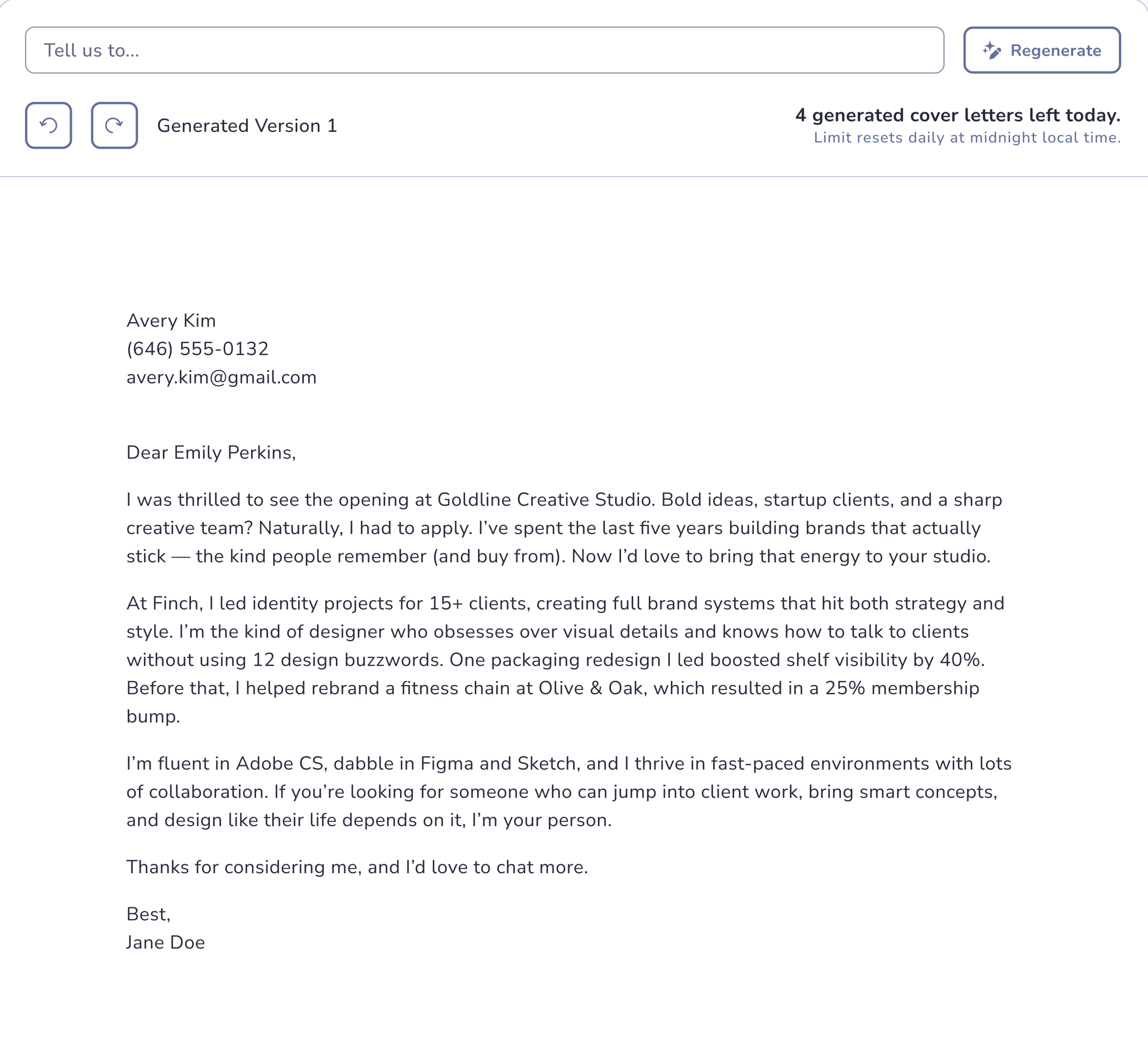
Sample 2: Software Engineer Applying to a Tech Company
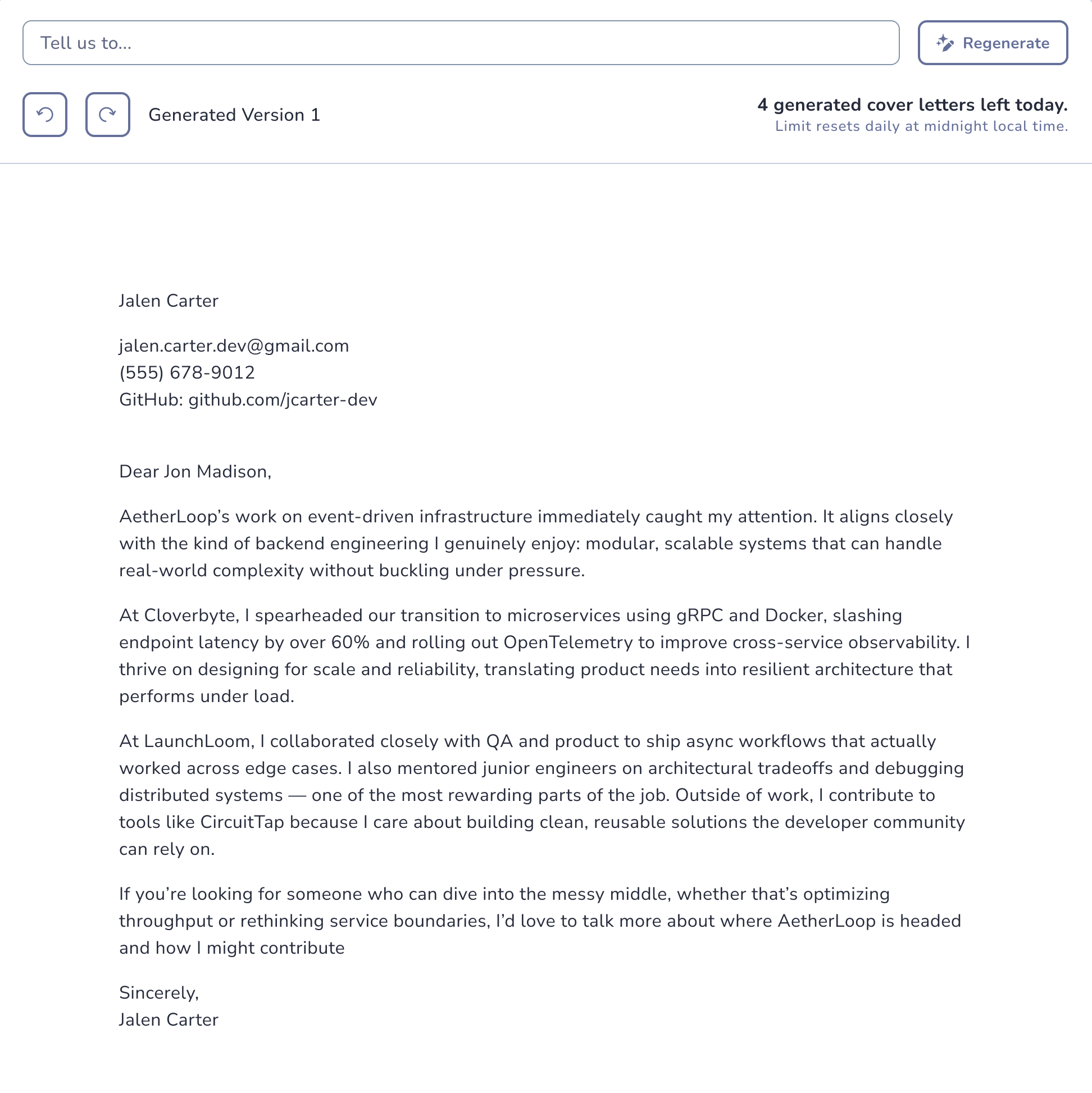
The Key Elements of a Strong Cover Letter
Before you start working on your cover letter, remember that it isn’t just a polite formality.
It’s your chance to connect the dots between your resume, the job ad, and what you’d actually say in an interview.
This is your chance to stand out among hundreds (or even thousands) of other candidates with seemingly similar work experiences. Without it, you might not make it to the interview stage.
Below are 8 must-have elements of a cover letter, with expert-backed tips to help you write each part with clarity, strategy, and impact.
Formatting
Use a professional font like Arial, Calibri, or Times New Roman in 11 or 12 pt. Stick to 1-inch margins, left-align the text, and keep the whole thing to one page max.
Save it as a PDF to lock in your formatting.
✅ Why this matters: Recruiters are skimming. You want your cover letter to look readable at a glance, not like a wall of text.
Contact Information
At the top, include your:
- Full name
- Phone number
- Professional email address (not your quirky high-school email address)
- Optional: LinkedIn profile (make sure it’s polished — check out our LinkedIn guide if you need help with that.)
Skip your full address. It’s outdated and takes up space you could use to say something meaningful.
Salutation
Avoid phrases like “To whom it may concern” or “Dear sir or madam.” They sound cold and dated, like you’re sending a letter by pigeon. Truly, thou dost maketh hiring managers most gravely shooketh.
Check the job ad, the company’s LinkedIn, and their “About Us,” “Team,” or “Careers” website pages to find the hiring manager’s name.
If not, “Dear Hiring Manager” works just fine.
Opening Paragraph
You have about 1–2 sentences to grab their attention. Skip the “I’m writing to express interest…” snoozefest.
Professional doesn’t mean boring. Even if they ask for a formal cover letter, there are ways to make it valuable and interesting.
Lead with something that shows you’re engaged and paying attention. Find a way to connect their company to yourself:
- “When I saw your team at [industry event], I was impressed by your work on [project], especially your focus on equity in education.”
- “I’m a UX designer who’s been following your product updates on Twitter for months. When I saw this role open up, I knew I had to apply.”
- “[Referral’s name] suggested I reach out. They spoke highly of your team’s mentorship and mission-driven work.”
Body Paragraphs
This is the heart of your cover letter.
In one or two paragraphs, succinctly connect your experience and skills to what the company is looking for. Show that you understand what they need and how you’re the person to do it.
Why it works:
- It leads with a clear depiction of what this candidate did.
- It proves the skill and seals the deal with a measurable outcome.
- It shows the candidate is in the loop with the prospective company’s goals.
- It hints at how the candidate could help the company and expresses enthusiasm to join.
Additional tips to elevate the body paragraphs:
✅ Mirror the language in the job ad, but naturally. If you’re applying for a role in a startup and you use formal, corporate language, you won’t leave a good impression. Same goes vice-versa: don’t be too friendly and informal when applying for a role in a large corporation. Adjust your language to who you’re speaking to.
✅ Pick 1–2 key achievements that show you can solve problems like the ones they’re facing.
✅ Show impact: numbers, outcomes, context. After each sentence you write, think “so what?” That will make you tie everything back to what they need and how you can give it to them.
Body paragraphs for creative roles
If you’re in a creative field (like design, writing, or marketing), this section is your sweet spot.
Don’t just tell them you’re creative. Show it through how you frame your experience and connect the dots.
Creativity isn’t just about being pretty or punchy. It solves business problems with originality. Use this part of your letter to show your thought process, not just the final result.
This isn’t just about being clever with words or visuals. It’s about demonstrating that you observe, think, test, and solve. A great cover letter lets you lay out that process in a way a bullet point on your resume can’t.
💡 Also: this is the perfect place to preview what’s coming in your portfolio. Maybe there’s an unusual side project that reflects your style. Or a messy campaign you navigated like a boss. Mention it here, with just enough intrigue to make them want to click through:
Bottom line: If you’re applying for a role that values originality, the body of your cover letter isn’t just a recap of your experience. It’s a creative sample in itself.
Closing Paragraph
Wrap it up with warmth and purpose. Reaffirm your interest, show enthusiasm for the next steps, and thank them.
Keep it forward-looking. Not desperate, and not overly formal. You’re not begging — you’re offering.
Signature
End with a simple, professional sign-off:
Sincerely,
[Your Full Name]
No need for your phone number or contact details again, they’re already at the top.
How to Tailor Your Cover Letter to the Job Ad
Here’s the truth: sending the same cover letter to 20 different jobs won’t get you interviews. It’ll get you ghosted.
Recruiters can spot a copy-paste job a mile away, and they often completely ignore those cover letters.
A cover letter needs to be targeted.
It’s about alignment between your experience, your resume, the language in the job post, and what you’d say in an interview.
When all those things work together, you’re no longer just a candidate, you’re a solution to their problem.
Sounds like a hassle? I promise it’s not as bad as it sounds. Once you come up with a “master”, general cover letter, adjusting it to specific companies and job ads won’t take more than 30 minutes.
Here’s how to achieve this.
Research the Company
Take some time to discover what the company cares about.
Look up their mission, values, and any recent news. Check their blog, LinkedIn, or press releases. You’re looking for clues:
- What are their values, their mission, and vision?
- Any recent news, events, or press releases?
- Any recent interviews with C-suite executives on the company’s direction for the future?
- What are the employees’ LinkedIn posts saying?
- What kind of language do they use?
- What’s clearly a priority for them right now?
- What’s the state of the industry they operate in?
- Why is this position even open? To replace someone, to add new value, etc.?
Then reflect that back in your letter. Not word-for-word, but naturally.
Remember that tailoring your cover letter to the company is not only about what you can do for them, but also about values fit, especially in mission-driven organizations or small teams where culture matters.
Check out these tips from one of our managers:
Connect with Your Experience
The job ad is a cheat sheet, it tells you exactly what to write about.
Review the job posting and identify the top 3–5 qualifications or responsibilities they mention. These will usually be high in the job ad, or there will be an explicit list of things they’re looking for.
Then, in your cover letter, speak directly to those points using examples from your own background.
In case you’re a Big Resume user, the Cover Letter Generator will ask you to upload the job ad you’re applying for, along with your resume. In seconds, you’ll get a custom-tailored cover letter that highlights exactly what hiring managers want to see.
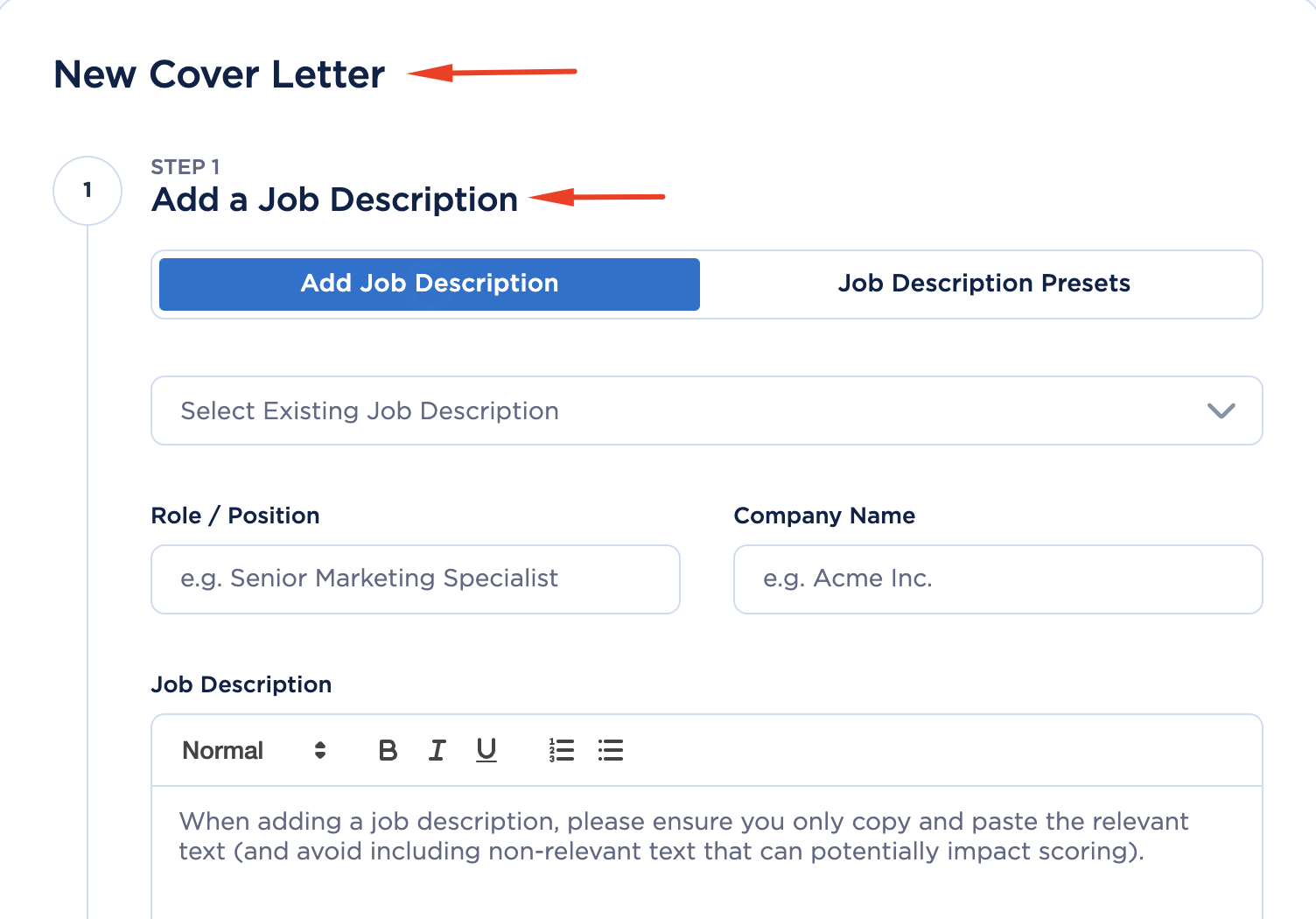
Here’s what connecting your cover letter with your experience might look like:
Imagine that you’re looking at a job ad that mentions project coordination and stakeholder communication. You could tie it to your experience (supposing you possess it) like this:
Address Unique Situations with Intention
In case you’re not a “typical” candidate (you’re a fresh grad with no experience, you’ve been laid off, you’re unemployed, you’re changing careers, etc.), it doesn’t mean you shouldn’t apply.
It just means your cover letter needs to guide the reader a bit more and help them understand your story and why you’re still a great fit.
If you’re a student or recent grad without much experience
Focus on coursework, internships, volunteering, or school projects. Emphasize what you learned and how it applies.
Don’t shy away from being enthusiastic. You’re not expected to know everything yet, but showing initiative goes a long way.
If you’re switching careers
Own it and connect the dots. Use your cover letter to reframe your previous experience and showcase your transferable skills. In that sense, the cover letter can be a bridge between where you were and where you’re going.
PS: If you need help, here’s how to discuss career change in interviews and how to find a new, better job.
If you’re unemployed (especially long-term)
You don’t need to explain your gap unless you want to. Focus on what you bring to the table now.
Be clear, honest, and forward-looking. What have you done to stay engaged or improve your skills? What are some soft skills you possess that could help you at your new job? Have you been praised for your flexibility or communication skills? Mention that. Show your reliability and capability.
No matter your background, tailoring your cover letter is about clarity, not perfection. Make it easy for the reader to see how you meet their needs. If your resume is the what, the cover letter is the why, and the job ad is your map.
Cover Letter Writing Formulas
There’s no one-size-fits-all way to write a cover letter. However, having a formula can make the process way less overwhelming.
Let’s break down a few proven structures that can help you organize your thoughts, hit the right notes, and sound genuine.
The Traditional Formula
There’s a reason this format has been around forever — it works. If you’re not sure where to start or just want a reliable structure to follow, this classic three-part formula is a solid bet:
Opening
Introduce yourself and state the role you’re applying for.
Include a quick hook to show genuine interest, maybe a reference to something specific about the company, a mutual contact, or a recent accomplishment of theirs that excited you.
Body
Highlight the key qualifications and experiences that make you a fit. Use specific, relevant examples.
Don’t regurgitate your resume. Instead, tell them why your experience matters for this role. Choose 1–2 strong examples that align with what the job ad is asking for — ideally, the stuff near the top of the requirements list.
If you’re light on direct experience, talk about transferable skills from school, personal projects, or past roles. Just connect the dots for them.
Closing
Wrap up with enthusiasm, a call to action (usually a request for an interview), and a thank you.
The Storytelling Formula
If the traditional formula is a handshake, this one’s a conversation.
The storytelling approach lets you lead with personality, invite the reader into your world, and make a memorable case for why you. It’s especially great for roles that value creativity, communication, or a strong personal brand (writing, design, education, nonprofit, and mission-driven roles).
Opening
Start with a brief anecdote or achievement that reflects your passion, work ethic, or area of expertise.
Keep it short and specific. This could be the moment you realized you wanted to work in this field, a mini story from a past job, or even a personal connection to the company’s mission. The goal is to set the tone and create an emotional connection.
Body
Tie the story to the job. Show how your background and growth journey make you a strong fit.
This is where you connect the dots and explain how the skills, traits, or mindset from your story translate to the role.
Closing
Reinforce your fit and enthusiasm. Remind them of the value you bring, and express genuine interest in the opportunity.
The Ultra-Short Formula
Yes, a cover letter can be super short. There’s no secret word count you need to hit or a “cover letter police” grading the length of your paragraphs.
If your letter gets straight to the point and shows the hiring manager that you understand the role and bring relevant skills to the table, mission accomplished.
This style is especially useful if you’re applying for a highly technical role, or if the employer clearly states the cover letter is optional.
Opening
Say what job you’re applying for and why.
Lead with a spark of enthusiasm or insight. If you can link your interest to a project, value, or approach the company is known for, even better. It doesn’t have to be flowery, but it should feel intentional.
Body
Show you’ve done similar things before, and done them well.
One sentence. Maybe two. Focus on past experience that closely matches the job. Don’t list everything, just choose one win or context that gives a taste of what you’d bring.
Closing
This is not the time for “I am confident I am the ideal candidate for this role because…”
You’re going for: short, warm, professional.
✅Pro tip: Just because it’s short doesn’t mean it’s rushed. Every sentence should earn its spot. Tight, thoughtful writing shows clarity, and that’s a skill in itself. Check out this sample:
Hi Mr. Patel,
I saw you’re looking for someone who writes clean, scalable code. In one of my recent open-source projects, I helped streamline data processing with Python, which really sharpened my approach to building efficient, elegant solutions.
For the past two years, I’ve been building web apps using React and Python, including work on UI performance and scalable architecture. I’d love to bring that experience to Acme Corp and contribute to your efforts to standardize coding structure across the team.
Thanks for considering my application — I’d be excited to chat more.
Best,
Jamie Chen
Common Cover Letter Mistakes to Avoid
Even a well-intentioned cover letter can fall flat if it’s riddled with small but avoidable mistakes. The good news is that most of them are easy to fix once you know what to look out for.
Here are four common pitfalls and how to steer clear of them.
Typos
You could be the most qualified person for the job, and still get skipped over because of a stray typo. It’s not just about grammar, it’s about attention to detail.
If a hiring manager sees “your” instead of “you’re,” they start to wonder how careful youre gonna be on the job. See what I did there?
How to prevent this:
- Use spell checkers
- Read your cover letter out loud
- Read it backwards
- Ask a friend or a family member to read it for you.
Being Generic
We already mentioned that if your cover letter could apply to any job at any company, it’s not doing its job.
Hiring managers are looking for specific reasons to hire you for this role, not a templated blurb you’ve sent to ten other companies.
For tips on how to avoid this mistake, scroll up to the “How to Tailor Your Cover Letter to the Job Ad” section.
See what our founder and chief coach had to say about this:
Repeating Your Resume Word for Word
Your resume lists your experience. Your cover letter should explain it.
If you just rehash the bullet points, you’re missing the opportunity to provide context, tell your story, and connect the dots for the reader.
What to do:
- Use the cover letter to give context. Why did you take that role? What did you learn? What are you proud of?
- Show your personality and voice.
- Think like a narrator, not a list-maker.
For example, instead of copying a bullet point that says “Managed 5 social media accounts,” say something like: “I loved creating campaigns that got people talking. We grew engagement by 40% in six months by leaning into humor and behind-the-scenes content.”
Being Too Focused on Yourself
It’s easy to fall into the trap of “me, me, me”, what I want, what I hope to gain, why this role excites me. But remember, hiring managers are mostly thinking about one thing: what’s in it for them.
So try to find a nice balance. You can mention why this role excites you, but you should also focus on what you bring to the table and how the company will benefit from it.
Express your enthusiasm but anchor it in how you’ll contribute.
How AI Changed Cover Letter Writing
Let’s talk about the elephant in the job search: yes, AI tools can write your cover letter now.
And while that might sound like either a lifesaver or a cheat code (depending on your level of burnout), the truth is somewhere in between.
The Benefits
Used well, AI can be a great assistant. It can:
- Help you get over that terrifying “blank page” moment
- Structure your letter in a logical way
- Speed up the process if you’re applying to multiple roles
This is a huge win if writing isn’t your strong suit, or if you just don’t know what employers want to hear in the first place.
The Drawbacks
Most AI-generated cover letters sound… like they were written by AI.
If you rely on default outputs without tailoring them, you risk sending in a letter that’s bland, robotic, and full of generic, meaningless phrases.
Recruiters can tell. And if your letter sounds like it came off an assembly line, it won’t help you stand out. It might even backfire.
Tips for Effectively Using AI to Write a Cover Letter (Because, Let’s Face It, You Will Use It)
Whether you’re a Big Resume user or just dabbling with free tools like ChatGPT, AI can be a solid writing partner if you know how to steer it.
But it’s not a one-click magic button, ‘cause you still need to do a bit of the thinking, refining, and personalizing.
Here’s how to use it like a pro and not end up with a letter that sounds like it was written by a polite toaster.
Start with a Specific Prompt
The more details you give the AI, the more useful the output will be. Specific prompts = tailored, usable drafts.
Avoid generic prompts like “Write me a cover letter, I am a junior data analyst.”
Instead, try to be as detailed as possible:
- Mention your role and background (degree, years of experience, etc.)
- Mention the industry you work in
- Mention the industry you want to pivot to, if you’re pivoting
- Mention the key points from your resume
- List your key skills and accomplishments (ideally quantified)
- Mention some company-specific details AI can add to make you stand out
- Tell the AI what kind of tone and language to use
✅Pro tip: After you provide AI with your detailed prompt, your final prompt can be:
This way, you’re giving it the chance to fill in the gaps with any potentially useful information you did not remember to include in your prompt.
Use AI to Refine, Not Replace Your Voice
One of the smartest ways to use AI is not to ask it to write your entire letter, but to improve what you already have.
Write a messy draft: bullet points, half-finished sentences, whatever. Then plug it into AI and ask something like:
Or:
That way, you’ll still be the author of your cover letter, and AI will be the editor. Because you still need to be the voice behind the message, especially when the goal is to land a job where your voice, thinking, and judgment matter.
Review, Personalize, Tweak
Once you have your draft, it’s time to review and edit it. This, I’d say, is the most important part of the process.
✅ Read it out loud. Does it sound like you?
✅ Check for cliches or phrases you’d never actually say.
✅ Add something personal, like an anecdote, a specific project, or even a joke if the role allows for it.
✅ Scrub anything that feels too formal, stiff, or oddly generic.
✅ Check for accuracy, because AI loves making stuff up, exaggerating results, or making weird claims that were not a part of your prompt.
Basically, polish the cover letter like you would if a friend wrote it for you, but didn’t know your exact vibe.
Mix and Match Versions
If you feel like experimenting, here’s a fun idea: generate several drafts using different angles or openings, then blend the best parts.
You can ask:
- “Write a cover letter that opens with a brief success story.”
- “Write a more formal version of this same letter.”
- “Write a cover letter using humor while remaining professional.”
Then take your favorite elements from each, an opener here, a phrasing tweak there, and build a version that’s uniquely yours.
Use Cover Letter Generator
If you’re a Big Resume user, it’ll be super easy.
Log in to Big Resume, then click “Cover Letters” in the navigation bar and choose “Generate Cover Letter”.
The Cover Letter Generator tool will ask you to upload the job ad you’re applying for (or select a pre-made job ad), your resume, and then generate a draft that’s customized to your unique experience and the role you want.

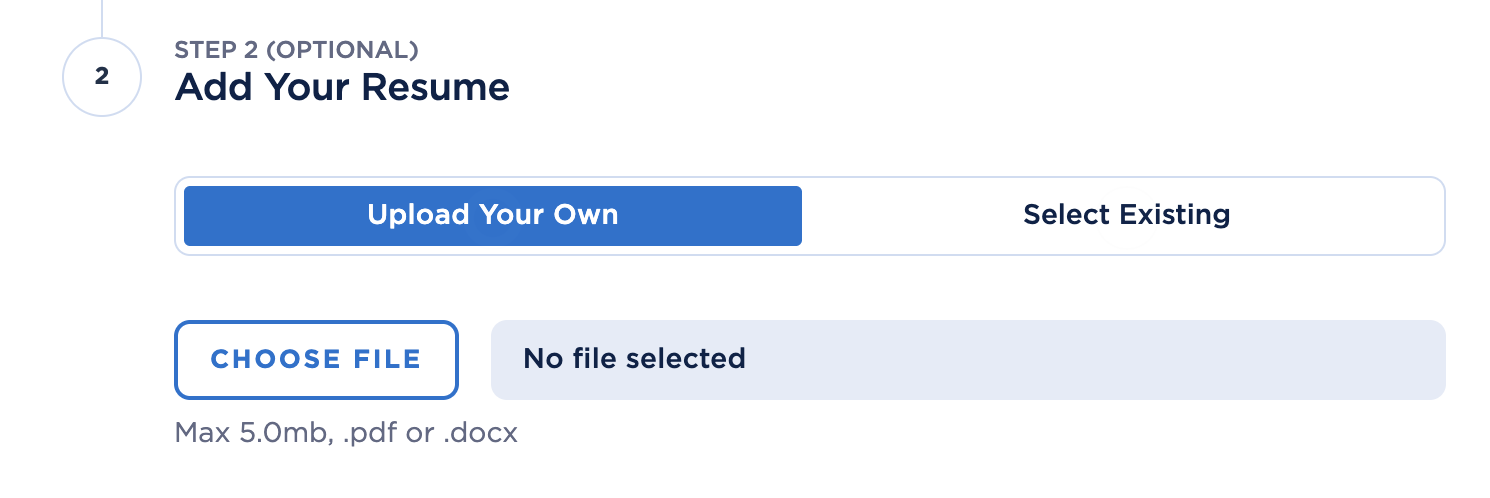
You still get full control to edit and tweak your cover letter, but you’re not starting from scratch and you’re not guessing what to say. It’s like having a career coach and writing assistant in your back pocket.
So yes, AI has changed cover letter writing. But in the right hands (ahem, ahem), it’s just another way to save time and energy, and tell your story more clearly.
Summary of the Main Points
- Writing cover letters is a pain. But most hiring managers still ask for them and nearly all think they are important to their decision-making process.
- Your cover letter isn’t your resume’s twin. It’s your chance to add context, tell a story, and explain why your experience matters for this job. When done correctly, you’re no longer just a candidate, you’re a solution to their problems.
- You can pick between several formats, like the traditional formula, the storytelling formula, and the ultra-short cover letter.
- Use AI to brainstorm ideas or polish rough drafts, but the core message still needs to come from you.
- The better your prompt, the better your results. If you’re using AI, feed it details: your achievements, results, skills, and how you can help the company. Vagueness will result in junk output.
- If you’re a Big Resume user, Cover Letter Generator makes this super easy. Just upload your resume and job ad, and it gives you a tailored draft to work from. It connects the dots between your materials, so your story feels cohesive and intentional.
____________________________________________________________________________
Need a hand? There are 3 ways we can help you:
- Tired of interviewing and not landing the job? Discover actionable lessons and interview practice here (Rated with 4.9/5 by 1,000,000 users).
- Learn How to Use AI to Write a Resume: Tips and Mistakes to Avoid.
- Get tips for How to Make Sure Your Resume Is ATS-Friendly.
FAQ
How long should a cover letter be?
Keep it to one page, as it should be short, sweet, and purposeful. You’re not writing a memoir but making a case for why you’re the right fit for this role. Aim for 3–4 paragraphs max: a strong opening, 1–2 meaty body paragraphs, and a confident closing. Every sentence should earn its spot.
Who to address a cover letter to if I don’t know the name of the hiring manager?
If you can’t find the name after a quick LinkedIn or company site search, “Dear Hiring Manager” works just fine. It’s respectful and safe. Avoid outdated stuff like “To Whom It May Concern,” it feels cold and old-school.
Do I always need a cover letter?
Not always, but if the job ad says it’s optional, treat it as strongly recommended. It’s your chance to stand out, show your personality, and connect the dots between your resume and the job. A good cover letter can tip the scales when competition is tough.
How to write a cover letter with no experience?
Focus on transferable skills, relevant coursework, volunteer work, or any projects where you demonstrated qualities the role needs, like communication, teamwork, or initiative. Use your voice to show you’re motivated and willing to learn. Enthusiasm counts, especially if experience is thin.
How to write a cover letter as the body of an email I’m attaching my resume to?
Keep it casual-professional. Start with a greeting, mention the role you’re applying for, and include a few key highlights from your full-length cover letter. Then say your resume is attached and sign off politely. You’re aiming for a polished note, not a full essay.
How to write a cover letter for an internship?
Internships are about learning, so don’t stress if your experience is limited. Focus on your interest in the field, any relevant studies, and why you’re excited to join this company. Mention what you hope to learn, what you can already bring to the table, and why you stand out.
How to write a cover letter for an internal position?
Show that you understand the company’s goals, highlight your contributions so far, and explain why this next step makes sense. Don’t assume they know everything you’ve done. Treat it like a real application, but with the added benefit of your insider insight.
